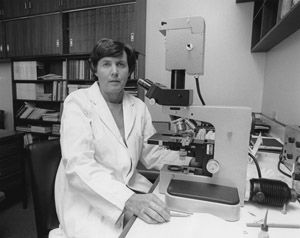With great sadness that ISSHP must announce the death of Professor Priscilla Kincaid-Smith, one of our Society’s former presidents (1992-1994). Dr Kincaid-Smith died peacefully at her Melbourne home on July 18, 2015 at the age of 88. Dr Kincaid-Smith’s work as an accomplished physician-researcher, a pathologist and a nephrologist and one of the original architects of the field of Nephrology in Australia, will be familiar to many.
Priscilla was born in South Africa, worked at Baragwanath Hospital in Johannesburg then studied pathology at the Hammersmith hospital in London, where she met her husband Dr Ken Fairley and they both moved to Australia soon after.
Her work in the field of pre-eclampsia, which included seminal manuscripts on the renal pathology of the disorder, was recognised by the Chesley Award in 1990 and her election as President of the Society two years later, after her Presidency of the Australasian branch of ISSHP. To the wider world however, she will be best remembered for her defining research that uncovered the link between analgesics and kidney disease which ultimately led to a restriction on over-the-counter sales, saving many lives; in fact, this condition has virtually disappeared.
Priscilla Kincaid-Smith was the first female professor at the University of Melbourne in 1975, President of the International Society of Nephrology (1972-75), the first female chair of the Royal Australian College of Physicians, the first female chair of the Australian Medical Association and the first female — and first Australian — chair of the World Medical Association. She achieved all this at a time when married women were often discouraged from pursuing clinical careers. She was the recipient of many honours including Commander of the Order of the British Empire “for services to medicine” in 1975, the David Hume Award from the National Kidney Foundation (USA) in 1989, and in the same year she became a Companion of the Order of Australia.
Many of us were fortunate to have known her and we remember her as a warm and generous colleague, diligent in her many committee roles and passionate about her work. The many honours bestowed upon her, however, do not reflect her remarkable achievements outside medicine: she once swam the English Channel and was a promising potential Olympian but decided to put her studies first. She was completely devoted to her family and is survived by her husband, supporter and life-long collaborator, Dr Ken Fairley, her three children and numerous grandchildren.
The Society would like to extend their deepest condolences to her family on the passing of such an extraordinary woman.

Priscilla Sheath Kincaid-Smith, Mrs. Fairley, AC, CBE (30 November 1926 – 18 July 2015)

